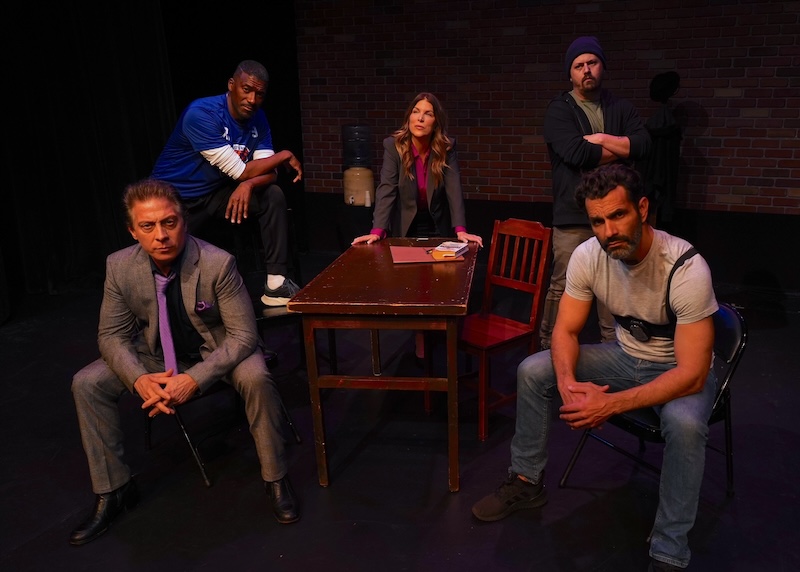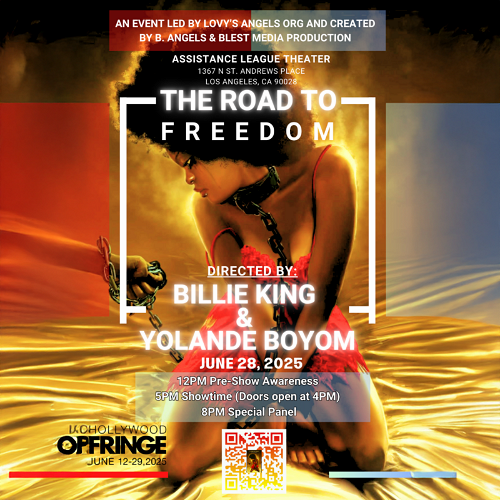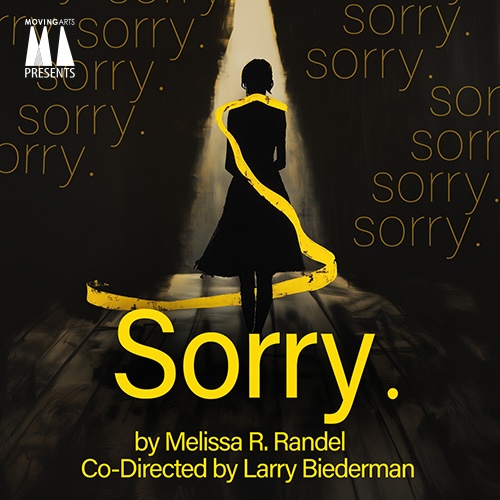
L to R: Louie Liberti, Moe Irvin, Tricia Small, Mitch Rosander and Dave Baez (Photo by Kenny Johnston)
Reviewed by Deborah Klugman
The Whitefire Theatre
Through April 27
In The Witness Room, playwright Pedro Antonio Garcia draws on his background as a civil rights and criminal defense attorney to explore the ugly ramifications of the Blue Wall of Silence, a term that refers to the predilection of police officers and their unions to back the assertions of individual members of the force regardless of whether those assertions are true or false. It’s a common scenario in film, on TV and, lamentably, in the world we live in, impacting most harshly on people without resources, who are made fodder for an overburdened and far too often dehumanized legal process. Directed by Bryan Rasmussen, Garcia’s play neatly encapsulates this twisted state of affairs, its conflict pivoting around an officer who perceives that supporting his colleagues’ statements may indict an innocent man.
The setting is a dim, sparely furnished room (Jeff G. Rack set, Derrick McDaniel lighting) adjacent to a trial chamber room in New York City, where a hearing is taking place to determine if a young Latino man should be prosecuted for possession of hard drugs. The prosecuting attorney, Andrea Volpi (Tricia Small) is a tough, hard-as-nails individual determined to make her case against the suspect, facts be damned. Sharing her scorn for the truth are three longtime police colleagues: T-J (Louis Liberti), of Italian extraction, Sampson (Moe Irwin) who is Black, and Kevin (Mitch Rosander) whose background is Irish. A fourth officer, Eli (Dave Baez), is a relative newcomer to the squad, a Puerto Rican guy still wrestling with himself over an (unspecified) act of violence he committed against a civilian. But even as Eli would just as soon forget the incident, the others keep lauding him for it.
The case that Volpi is trying to make has problems. The gun the officers claim to have spotted on the suspect’s person turned out not to be a gun at all. And a haze of uncertainty hangs over their claim of possession. The men’s accounts differ, something that the bull-doggish Volpe is determined to change as she drills each in turn on what he should say in front of the judge. Her bulldog persistence in pursuing a minor offender (if he’s even an offender at all!) speaks to the notches-on-the-belt mindset of ruthless prosecutors — even more egregiously cruel than thaty of the cops.
Garcia’s dialogue shapes this debate about what’s right and what’s wrong through potentially interesting well-rounded characters. The play illustrates how the pursuit of justice — as progressives like myself see it — is anathema to these officers, who nonetheless view themselves as defenders of the community at large. If a few innocent guys get caught up with the system, well, so be it. Against their indifference to individual justice, we have Eli, a troubled man but a professed Christian who wants to do the right thing while facing enormous pressure to conform. This has the makings of compelling drama.
Unfortunately, while The Witness Room carries the potential to land a punch, here, instead, too much attention seems to have been paid to cultivating a sense of the subculture of the police. What we observe are actors relying almost exclusively on external mannerisms to convey their characters’ substance, instead of personas that emanate from the inside out.
The Whitefire Theatre, 13500 Ventura Blvd., Sherman Oaks. Sat., 8 pm; thru April 27. www.whitefiretheatre.com Running time: approximately 90 minutes with an intermission.




















